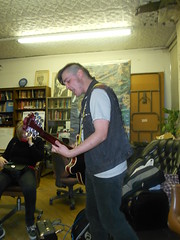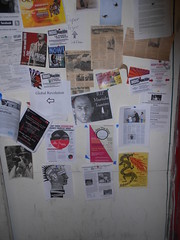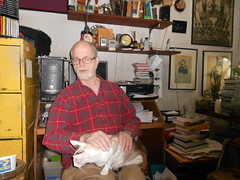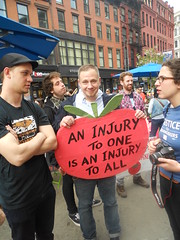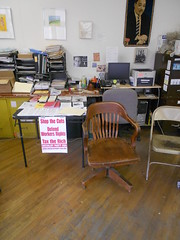Anarchists weren’t the only oft-maligned political group to convene in the East Village this weekend. The Socialist Party USA, which has about 1,000 members nationwide, hosted a regional conference that drew a modest 15 people from New York City, Long Island and New Jersey to the party’s third-floor offices in the building known as the Peace Pentagon.
The Muste Building, a rundown three-story loft structure on Bleecker and Lafayette Streets, was named after a Dutch-born Pacifist clergyman, and has gone by its alternate name since the 1970s. Radical groups like the Granny Peace Brigade, Global Revolution TV, and the War Resisters League (which once owned the building) are among about 10 non-profits currently maintaining low-rent offices plastered with posters, announcements and pictures of New York anarchist icons like Emma Goldman.
On Saturday, entry into the Socialist Party USA’s quarters was $5, which got attendees music, a talk from a French leftist, dinner, a protest rally and plenty of lively conversation.
The notion that President Obama is a socialist elicited chuckles from a few people seated on folding chairs and snacking on grapes and potato chips near a portrait of Martin Luther King, Jr. Greg Pason, national secretary of the S.P.U.S.A. and its only salaried employee, characterized Mr. Obama’s legislative mandate for everyone to buy health insurance as a “regressive tax on people.”
During an opening reception, Rob Miller, a punk rock musician, strummed his guitar and belted out working-class anthems. One high-decibel rouser was written about “police brutality against Occupy Wall Street,” he said.
David McReynolds, 82, a one-time staffer for the now-defunct Liberation magazine and a field secretary at the War Resisters League for 39 years, listened attentively to Mr. Miller’s songs. He’s long been a major player on the anti-authoritarian left, burning his draft card at Union Square in 1965 with four other demonstrators protesting U.S. involvement in the Vietnam War.
During a conversation with The Local at his rent-controlled apartment in the East Village earlier in the day, Mr. McReynolds recalled that his form of democratic socialism was considered especially radical during his student days at UCLA. “The Soviet Union considered me an agent of the state,” he said. “At UCLA, one of the kids in the Communist Party said, ‘We know you’re working for the FBI because you people say things that are much more radical than what we dare to say.'” This was in the 1950s when, he said, the ideological lines were “very rigid.”
These days, Mr. McReynolds believes America is ready for democratic socialism, adding, however, “that doesn’t mean it’s going to happen.” He ran for president twice himself – the first openly gay man to do so. He also ran for Congress twice, once in 1968 on the Peace and Freedom ticket headed by Black Panther Eldridge Cleaver, and once for the U.S. Senate, garnering nearly 40,000 votes in the 2004 race that ended in the re-election of Charles E. Schumer.
The Socialist Party USA was a minority faction of the Socialist Party of America which took its name and established a new organization in 1973. Mr. McReynolds, a member, described it as “the historical Socialist Party, the party of Norman Thomas and Eugene Debs.” Key figures in the party have included Frank Zeidler, elected mayor of Milwaukee in 1948. Today’s members pay annual dues on a sliding scale. Students are charged $15 a year; waivers are granted in cases of financial hardship. Membership includes full voting rights, subscription to a magazine called The Socialist and access to party e-mail discussion lists.
Meanwhile, there have been reports that the Muste Building that fosters the party’s mission is being beset with creeping capitalism. Mr. Reynolds, a member of the Board of Directors of the A.J. Muste Memorial Institute, said that DNAinfo’s recent report that the board was considering selling the building and turning it into condos was “unfair and inaccurate.” He explained, “There were a number of options on the table because the building is in very bad shape. It needs renovation, which is very expensive.”
Problems at the Muste Building, he said, were exacerbated by construction at the Bleecker Street subway station, prompting concern from the city’s Department of Buildings that the building was unstable and tenants might have to be evacuated. Although the subway didn’t destabilize the building as feared, Mr. McReynolds said the repairs had to be made. “We must make them to be in compliance with the city and they will amount to over a million dollars. That’s our problem and we’re in a bind. We would sell if we made enough from the sale to relocate the current tenants to another building. But we’re not sure what to do.”
Mr. Pason, 46, who was once homeless and lived in a squat below Tompkins Square Park in the mid-1980s, said he became a socialist after hearing Mr. McReynolds speak. He’s now running for U.S. Senate in his native New Jersey. According to his website, his platform planks include abolition of private health insurance companies, public ownership and community control of the pharmaceutical industry, creation of a high-speed rail system and “full support of women’s right to choose.”
During a break in the conference’s workshops, Mr. Pason and his teenage son, Trevor, joined about 10 Party members at a noon rally in Union Square to support Florida farm workers who had gathered outside Chipotle Mexican Grill. Holding placards in Spanish and English, the demonstrators railed against the chain’s refusal to sign the Coalition of Immokalee Workers Fair Foods program.
Mr. Pason held a sign that read: “An injury to one is an injury to all.” Nearby stood Kimberly Ortiz of the Bronx, who chairs S.P.U.S.A.’s New York City local. Ms. Ortiz, 27, said she became a Socialist after a friend invited her to to a S.P.U.S.A. meeting at the Muste Building. “I stuck around and never went back,” recalled Ms. Ortiz, who works full-time as an organizer for the Retail, Wholesale and Department Store Union.
The Socialist Party USA voted for Stewart Alexander and Alex Mendoza to head their 2012 presidential ticket during the party’s convention last October in Los Angeles. The candidates are on ballots in at least nine states but must get 15,000 signatures from a majority of New York’s congressional districts to qualify for placement on the state’s ballot. Ms. Ortiz acknowledges that the two men have no chance of winning.
“We know we’re not going to win the election but as long as more people know we’re out there, and know there are more options, they’ll know what we’re actually about instead of all this stigma about the word socialism,” she said.
“We’re trying to initiate conversations with people,” said Billy Wharton, the Party’s co-chair from Brooklyn, when members returned to the Muste Building to hear a talk by a member of the Left Party in France. “Through the conversations, people will find that we’re talking about issues that affect their lives directly. We’re talking about everyone having health care; we’re talking about work sites with dignity and where people are treated with respect. We’re talking about very basic ideas of living in a green environment, something that capitalism cannot provide.”
The U.S. has drifted “so far to the right that things we thought were starters to conversations in the 50s, 60s and 70s — like the right to unionize, the right to a free abortion — are now open and it’s like some new thing,” said Kristin Schall, editor of The Socialist magazine who has a day job teaching at a private school in Manhattan. “So a lot is playing catch-up and you try to be clear and say, ‘Look, we already fought this battle and it’s been won. Now we’re looking further left.’ But we are also trying to maintain the things we already [have].”
Ms. Schall believes that New York City, seed ground for multitudes of radical causes, is now one of the most undemocratic regions in the country, with institutions like the public schools and mass transportation managed by political appointees. “The people who use these systems everyday have no say in how they are run,” she said.”I think this is a a direct response to the strength of radical politics in the history of New York. People are saying , ‘Look, they’re starting to win, they’re getting elected, they’re getting power.’ And the establishment is now in a reactionary mood.”



